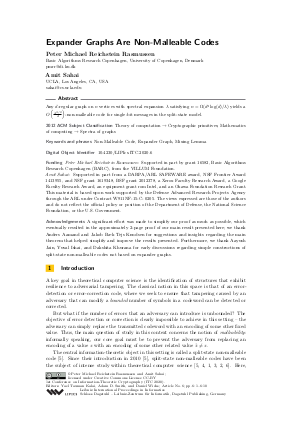Expander Graphs Are Non-Malleable Codes
Authors Peter Michael Reichstein Rasmussen, Amit Sahai
-
Part of:
Volume:
1st Conference on Information-Theoretic Cryptography (ITC 2020)
Part of: Series: Leibniz International Proceedings in Informatics (LIPIcs)
Part of: Conference: Conference on Information-Theoretic Cryptography (ITC) - License:
 Creative Commons Attribution 3.0 Unported license
Creative Commons Attribution 3.0 Unported license
- Publication Date: 2020-06-04
File

PDF
LIPIcs.ITC.2020.6.pdf
- Filesize: 456 kB
- 10 pages
Document Identifiers
Subject Classification
ACM Subject Classification
- Theory of computation → Cryptographic primitives
- Mathematics of computing → Spectra of graphs
Keywords
- Non-Malleable Code
- Expander Graph
- Mixing Lemma
Metrics
- Access Statistics
-
Total Accesses (updated on a weekly basis)
0Document
0Metadata
Abstract
Any d-regular graph on n vertices with spectral expansion λ satisfying n = Ω(d³log(d)/λ) yields a O((λ^{3/2})/d)-non-malleable code for single-bit messages in the split-state model.
Cite As Get BibTex
Peter Michael Reichstein Rasmussen and Amit Sahai. Expander Graphs Are Non-Malleable Codes. In 1st Conference on Information-Theoretic Cryptography (ITC 2020). Leibniz International Proceedings in Informatics (LIPIcs), Volume 163, pp. 6:1-6:10, Schloss Dagstuhl – Leibniz-Zentrum für Informatik (2020)
https://doi.org/10.4230/LIPIcs.ITC.2020.6
BibTex
@InProceedings{rasmussen_et_al:LIPIcs.ITC.2020.6,
author = {Rasmussen, Peter Michael Reichstein and Sahai, Amit},
title = {{Expander Graphs Are Non-Malleable Codes}},
booktitle = {1st Conference on Information-Theoretic Cryptography (ITC 2020)},
pages = {6:1--6:10},
series = {Leibniz International Proceedings in Informatics (LIPIcs)},
ISBN = {978-3-95977-151-1},
ISSN = {1868-8969},
year = {2020},
volume = {163},
editor = {Tauman Kalai, Yael and Smith, Adam D. and Wichs, Daniel},
publisher = {Schloss Dagstuhl -- Leibniz-Zentrum f{\"u}r Informatik},
address = {Dagstuhl, Germany},
URL = {https://drops.dagstuhl.de/entities/document/10.4230/LIPIcs.ITC.2020.6},
URN = {urn:nbn:de:0030-drops-121114},
doi = {10.4230/LIPIcs.ITC.2020.6},
annote = {Keywords: Non-Malleable Code, Expander Graph, Mixing Lemma}
}
Author Details
- Basic Algorithms Research Copenhagen, University of Copenhagen, Denmark
Funding
- Rasmussen, Peter Michael Reichstein: Supported in part by grant 16582, Basic Algorithms Research Copenhagen (BARC), from the VILLUM Foundation.
- Sahai, Amit: Supported in part from a DARPA/ARL SAFEWARE award, NSF Frontier Award 1413955, and NSF grant 1619348, BSF grant 2012378, a Xerox Faculty Research Award, a Google Faculty Research Award, an equipment grant rom Intel, and an Okawa Foundation Research Grant. This material is based upon work supported by the Defense Advanced Research Projects Agency through the ARL under Contract W911NF-15-C- 0205. The views expressed are those of the authors and do not reflect the official policy or position of the Department of Defense, the National Science Foundation, or the U.S. Government.
Acknowledgements
A significant effort was made to simplify our proof as much as possible, which eventually resulted in the approximately 2-page proof of our main result presented here; we thank Anders Aamand and Jakob Bæk Tejs Knudsen for suggestions and insights regarding the main theorem that helped simplify and improve the results presented. Furthermore, we thank Aayush Jain, Yuval Ishai, and Dakshita Khurana for early discussions regarding simple constructions of split-state non-malleable codes not based on expander graphs.
References
-
Divesh Aggarwal, Yevgeniy Dodis, and Shachar Lovett. Non-malleable codes from additive combinatorics. In Symposium on Theory of Computing, STOC, 2014.

-
Eshan Chattopadhyay, Vipul Goyal, and Xin Li. Non-malleable extractors and codes, with their many tampered extensions. In Symposium on Theory of Computing, STOC, 2016.

-
Eshan Chattopadhyay and David Zuckerman. Non-malleable codes against constant split-state tampering. In Foundations of Computer Science, FOCS, 2014.

-
Stefan Dziembowski, Tomasz Kazana, and Maciej Obremski. Non-malleable codes from two-source extractors. In CRYPTO, 2013.

-
Stefan Dziembowski, Krzysztof Pietrzak, and Daniel Wichs. Non-malleable codes. In ICS, 2010.

-
Xin Li. Improved non-malleable extractors, non-malleable codes and independent source extractors. In Symposium on Theory of Computing, STOC, 2017.

- Luca Trevisan. Luca trevisan’s `in theory' blog. https://lucatrevisan.wordpress.com/2011/02/28/cs359g-lecture-16-constructions-of-expanders/. Accessed: 2018-09-27. URL: https://lucatrevisan.wordpress.com/2011/02/28/cs359g-lecture-16-constructions-of-expanders/.
